初中英语重要短语的用法及区别(好) 15
初中英语重要短语、惯用法(36组、按字母顺序)
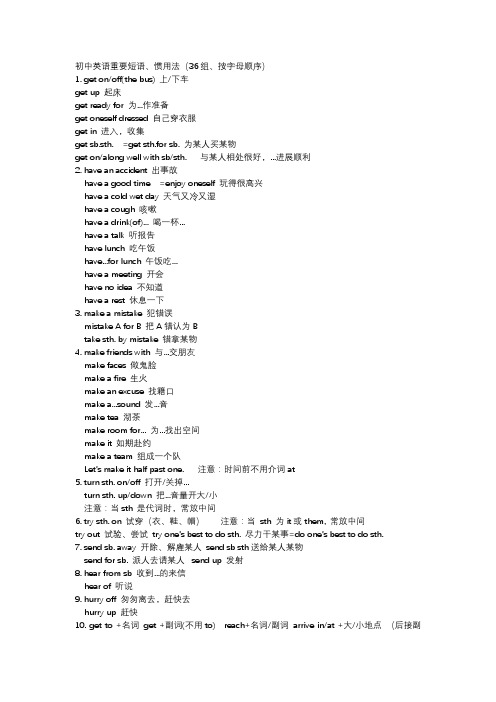
初中英语重要短语、惯用法(36组、按字母顺序)1. get on/off(the bus) 上/下车get up 起床get ready for 为...作准备get oneself dressed 自己穿衣服get in 进入,收集get sb.sth. =get sth.for sb. 为某人买某物get on/along well with sb/sth. 与某人相处很好,...进展顺利2. have an accident 出事故have a good time =enjoy oneself 玩得很高兴have a cold wet day 天气又冷又湿have a cough 咳嗽have a drink(of)... 喝一杯...have a talk 听报告have lunch 吃午饭have...for lunch 午饭吃...have a meeting 开会have no idea 不知道have a rest 休息一下3. make a mistake 犯错误mistake A for B 把A错认为Btake sth. by mistake 错拿某物4. make friends with 与...交朋友make faces 做鬼脸make a fire 生火make an excuse 找籍口make a...sound 发...音make tea 沏茶make room for... 为...找出空间make it 如期赴约make a team 组成一个队Let’s make it half past one.注意:时间前不用介词at5. turn sth. on/off 打开/关掉...turn sth. up/down 把...音量开大/小注意:当sth 是代词时,常放中间6. try sth. on 试穿(衣、鞋、帽)注意:当sth 为it或them, 常放中间try out 试验、尝试try one’s best to do sth. 尽力干某事=do one’s best to do sth.7. send sb. away 开除、解雇某人send sb sth送给某人某物send for sb. 派人去请某人 send up 发射8. hear from sb 收到...的来信hear of 听说9. hurry off 匆匆离去,赶快去hurry up 赶快10. get to +名词get +副词(不用to) reach+名词/副词arrive in/at +大/小地点(后接副词,不用at/in) eg. get to Shanghai、reach Shanghai 、arrive in Shanghai到达上海eg. reach home、get home、arrive home 到家11. teach sb. English 教某人英语teach oneself=learn sth.by oneself 自学12.到...末为止by the end of +过去时间(用于过去完成时)by the end of +将来时间(用于一般将来时)at the end of+地点在...尽头in the end= at last 最后,终于13. hundreds of 成百上千five hundredthousands of 成千上万的six thousandmillions of 成百万的 seven million14. be pleased to do sth 很高兴地干某事be pleased with sth. 为某事而高兴15. be used for 被用来used to do sth过去做----be used as 被当作be used to doing sth 习惯于做谋事be used by 被...所使用 be used to do sth 被用来做谋事16. so far 到目前为止,in the past/last few years 用于现在完成时17. on a Tuesday morning 一个星期二的早上on the morning of June 15th.1998 在1998年6月15日早上18. keep sb.doing sth. 让某人一直干某事keep doing sth. 继续做某事keep on doing sth. 持续不断地做某事19. much too+形容词/副词原级实在太...too much+不可数名词相当多的...eg. It’s _______ expensive. I can’t buy it. There’s ___________ rain this year.20. thanks to...由于,多亏thanks to one’s help=because of one’s help 由于某人的帮忙thanks for one’s help 谢谢某人的帮助21. be far away from+a place/sb 远离某地22. because of + n.eg Because of the rain, we can’t go out.类似还有instead of sb/sth23. two-month holiday=two months’ holiday 二个月的假期 an eight—year—old child 一个八岁的孩子24. fall asleep 入睡(进入状态)get to sleep 入睡(还没睡着)25. stop sb.from doing sth. 阻止某人干某事eg. She stopped the child from listening.stop doing sth. 停止干某事,不再干某事stop to do sth. 停止下来干另一件事。
初中英语中考常用词汇词组短语用法区分(共24组)
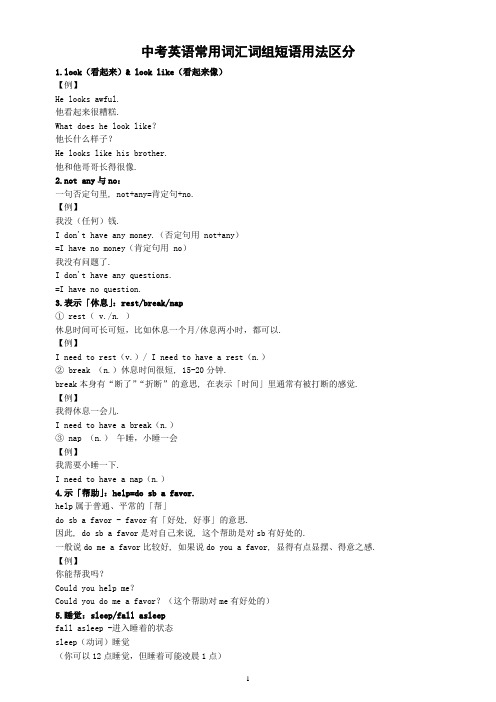
中考英语常用词汇词组短语用法区分1.look(看起来)& look like(看起来像)【例】He looks awful.他看起来很糟糕.What does he look like?他长什么样子?He looks like his brother.他和他哥哥长得很像.2.not any与no:一句否定句里, not+any=肯定句+no.【例】我没(任何)钱.I don't have any money.(否定句用 not+any)=I have no money(肯定句用 no)我没有问题了.I don't have any questions.=I have no question.3.表示「休息」:rest/break/nap① rest( v./n. )休息时间可长可短,比如休息一个月/休息两小时,都可以.【例】I need to rest(v.)/ I need to have a rest(n.)② break (n.)休息时间很短, 15-20分钟.break本身有“断了”“折断”的意思, 在表示「时间」里通常有被打断的感觉. 【例】我得休息一会儿.I need to have a break(n.)③ nap (n.)午睡,小睡一会【例】我需要小睡一下.I need to have a nap(n.)4.示「帮助」:help=do sb a favor.help属于普通、平常的「帮」do sb a favor - favor有「好处, 好事」的意思.因此, do sb a favor是对自己来说, 这个帮助是对sb有好处的.一般说do me a favor比较好, 如果说do you a favor, 显得有点显摆、得意之感. 【例】你能帮我吗?Could you help me?Could you do me a favor?(这个帮助对me有好处的)5.睡觉:sleep/fall asleepfall asleep -进入睡着的状态sleep(动词)睡觉(你可以12点睡觉,但睡着可能凌晨1点)【例】我昨晚12点就睡了, 但1点才睡着.I went to sleep at 12 last night, but I fell asleep at 1.6.in time及时/on time准时比如:约7点见面.in time及时, 指在7点之内就到了, 可能还不到7点就到了.on time准时/按时, on是在...上面, 如果正好在7点上, 等于正好7点准时到.7.征求... ask for....ask sb for permission向某某请求同意ask for sb's permission请求某某的同意2种都可以用8.洗澡:shower/bathtake a shower(淋浴 ,花洒的洗澡)have a bath(泡澡 ,带浴缸的)bath tub浴缸9.工作:job/workjob-工作的名词,找了一份/两份工作work-工作的内容【例】我找到了2份工作.I found two jobs.我的工作没做完.I didn't finish my work.10.想要/需要:want/needwant和need的用法相同, 后面都可以:+to do+sb to do+n.(名词)+to+be+形容词(a.)【例】我需要你的帮助.+n.(名词)I need/want your help.(help在这里是名词)我想要洗澡I need a shower.(+名词)I need to take a shower(+to do)我需要你帮我.+sb to doI need/want you to help me.(help在这里是动词)我想让你开心I want you to be happy.(+形容词)-happy是形容词,前面加be,to后面要加动词,be是系动词,也属于动词的一种综上,有动词+do没有动词:用名词/形容词/介词短语/副词/done,且这些词前面一定要+be动词11.表示「担心」:worried(a.)-状态worry(v.)-动作【例】我不想让你担心.I don't want you to be worried.-句中没有动词,worried是形容词, 前面要加be(只要没有动词,就要+be动词)我真的很担心你.I really worry about you.(worry-动词)12.想要/需要:need/have to口语中都可以表示“得.../不得不.../不用.../不需要.../不必...”我得把作业做了I need/have to finish my homework.(+to do)你得休息了.You need a rest.(+n.)You need/have to rest.(+to do)你不用/不必关心我.You don't have to care about me.13.want/be going to do① want想(要),表示意愿和欲望,都是脑子里的想法,实际上会不会去做未知② be going to do要,准备,打算,表示主语/说话人的计划,基本上要实施(实际生活中,要结合实际情景运用)14.最好...had better (not) do sth.【例】你最好去看医生.You had better go to see a doctor.(也可略写成 You’d better...)15.有...要....have sth to do【例】我有很多作业要做.I have a lot of homework to do.我没钱看电影.I don't have money to watch movie.16.already(已经)&yet(还)① already&yet都是副词(adv.), 在现在完成时中, 可加可不加.-如果加上, 有点儿”锦上添花“的意思.-如果不加, 对「现在完成时强调动作已完成」也不影响.「现在完成时」回顾 :【笔记】0基础入门英语语法 | 时态:现在完成时&一般过去时, 怎么区分?【例】他已经写完作业了.He has finished homework.He has finished homework already.(两句话意思相同)② already用于肯定句, yet多用于否定句/疑问句.【例】他已经写完作业了.He has finished homework already.他还没写完作业.He hasn't finished homework yet.③如果不使用现在完成时(不强调动作已完成), 句中用already&yet, 则表示已经处于某种状态.【例】我已经在路上了.I'm already on the way.他还不是个老师.He is not a teacher yet.(事情还没发生)综上:-句中有动作, 且强调动作已完成, 用现在完成时, 表示「已经/还」, already/yet可加可不加.-句中没有动作, 不强调动作完成, 不用现在完成时, 只强调已经处于某种状态, 要加already/yet.17.表示「还...」:yet&still① yet用于否定句/疑问句, 通常翻译为:还没...② still用于肯定句, 通常翻译为:仍然.../还...【例】他们仍然(还)记得那天.They still remember that day.我还没回家.I'm not home yet.18.表示「再...」again & any more① again用于肯定句/否定句② any more用于否定句/疑问句, 通常翻译为:再也不.../不再....③ again表示「再一次...」,any more既可以表示「程度」,又可以表示「次数」【例】我再也不吃糖了.I will not eat candy again/any more.我再也不会输了.I won't lose again.(下一次不会再输)I won't lose any more.(不会输)非谓语动词做名词(宾语)I(主) like(谓) making friends(宾).I finish doing my homework.(关于「非谓语动词」, 咱后边还会专门讲, 敬请关注~)19.表示「擅长...」be good at doing sth- good是形容词, be good是「系表」结构, 如果前面加上主语, 则结构完整, 后面可以加adv./介词短语.- at是介词, 后面不可能再用动词, 所以doing是把动词加上ing变成名词, 在这里与前面的介词共同构成介词短语.- 用法延伸:be good表示「XXX很好」, good也可以替换成其它表示”好“的形容词:great/fantastic...↓be good/great/fantastic...+at doing sth.20.使动词用法&make两者都有“让某人....”的意思, 区别在于:① make后面只能加使动词的形容词(a.)形式, 构成「主谓宾+宾补」的结构②使动词本身就有“让某人....”的意思综上:make sb +a.(主谓宾宾补)让...disappoint(使动词) sb让...失望=make sb disappointed(a.)=let sb down【例】我不想让你失望.I don't want to disappoint you.I don't want to make you disaapointed.I don't want to let you down.「使动词」相关知识点回顾 :【笔记】英语语法入门到精通(19)| 动词之:使动词(用法&归纳)21.表示「选择」:choice (n.), 复数形式:choiceschoose (v.)【例】菜单上有很多选择, 但我的选择是汉堡 .The menu had a lot of options, but my choice was the burger.我必须在今晚去健身房还是去看电影之间做选择.I have to choose between going to the gym or watching a movie tonight.22.表示「听到/听说」hear(vt)听到, 直接加人/物,都是可以发出声音的hear(vi) +介词of/about-听说【例】我能听到窗外的鸟叫.I can hear(vt.) the birds chirping outside my window.-hear后面直接跟鸟bird, 是可以发声的.我以前从未听说过那个餐厅.I've never heard of that restaurant before.你听说过市中心刚刚开业的新店吗?Have you heard about the new store that just opened downtown?-hear是不及物动词(vi),后面必须加介词, 表示“听说...”23.pick sb up捡起来, 接某人【例】我的朋友下班后要来接我.My friend is going to pick me up after work.24.表示「同意」① agree to 暗示了决定做某事的意愿是由别人提出或请求的, 有被迫同意的意味② agree with 同意某人的观点,它意味着一个人的观点与另一个人的观点是一致的③ agree on 意为与别人达成协议或共同决定。
初中英语中的常见短语用法总结
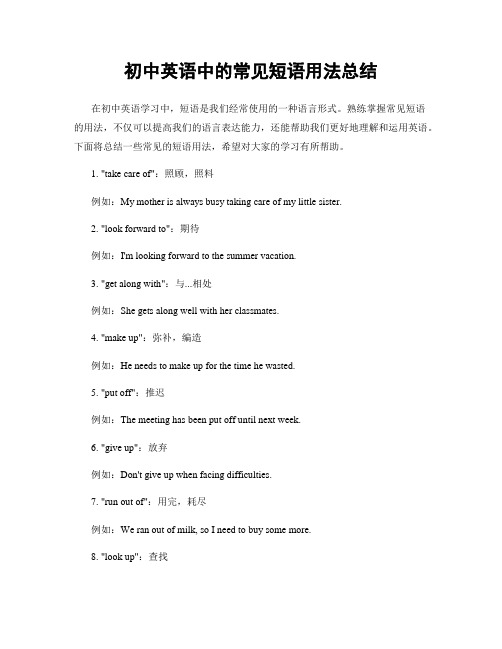
初中英语中的常见短语用法总结在初中英语学习中,短语是我们经常使用的一种语言形式。
熟练掌握常见短语的用法,不仅可以提高我们的语言表达能力,还能帮助我们更好地理解和运用英语。
下面将总结一些常见的短语用法,希望对大家的学习有所帮助。
1. "take care of":照顾,照料例如:My mother is always busy taking care of my little sister.2. "look forward to":期待例如:I'm looking forward to the summer vacation.3. "get along with":与...相处例如:She gets along well with her classmates.4. "make up":弥补,编造例如:He needs to make up for the time he wasted.5. "put off":推迟例如:The meeting has been put off until next week.6. "give up":放弃例如:Don't give up when facing difficulties.7. "run out of":用完,耗尽例如:We ran out of milk, so I need to buy some more.8. "look up":查找例如:If you don't know the meaning of a word, you can look it up in the dictionary.9. "take off":起飞,脱下例如:The plane took off on time.10. "turn on/off":打开/关闭例如:Please remember to turn off the lights when you leave the room.11. "pick up":拾起,接人例如:I picked up the book from the floor.12. "set up":建立,设立例如:We set up a new club at our school.13. "get on/off":上车/下车例如:Please wait until the bus stops before getting on or off.14. "look after":照顾,照料例如:My grandparents look after me when my parents are away.15. "give in":屈服,让步例如:Don't give in to peer pressure.16. "turn up/down":调高/调低例如:Can you turn up the volume? I can't hear the music.17. "take out":取出,带出去例如:I took out some money from my wallet.18. "look out":当心,小心例如:Look out! There's a car coming.19. "get over":克服,恢复例如:It took her a long time to get over the loss of her pet.20. "put on":穿上,涂抹例如:She put on her coat and went out.以上是初中英语中常见短语的用法总结。
初中英语常见短语固定搭配总结
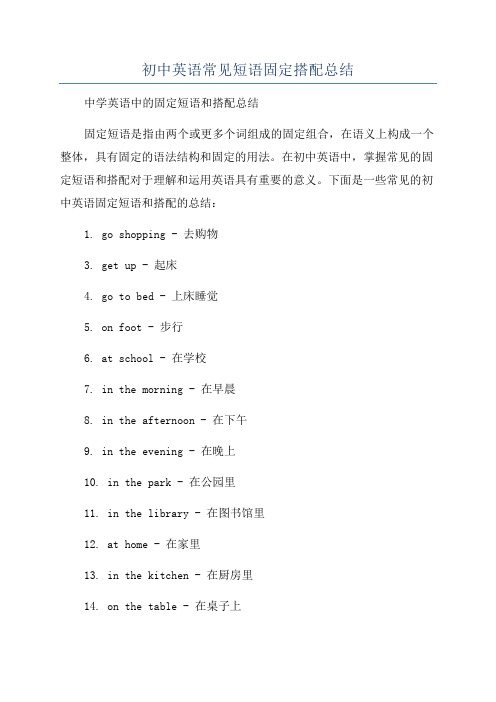
初中英语常见短语固定搭配总结中学英语中的固定短语和搭配总结固定短语是指由两个或更多个词组成的固定组合,在语义上构成一个整体,具有固定的语法结构和固定的用法。
在初中英语中,掌握常见的固定短语和搭配对于理解和运用英语具有重要的意义。
下面是一些常见的初中英语固定短语和搭配的总结:1. go shopping - 去购物3. get up - 起床4. go to bed - 上床睡觉5. on foot - 步行6. at school - 在学校7. in the morning - 在早晨8. in the afternoon - 在下午9. in the evening - 在晚上10. in the park - 在公园里11. in the library - 在图书馆里12. at home - 在家里13. in the kitchen - 在厨房里14. on the table - 在桌子上15. at the weekend - 在周末16. in the photo - 在照片里17. in front of - 在……前面18. behind the house - 在房子后面19. near the station - 在车站附近20. far from here - 离这里远21. walk to school - 走路去学校22. take the bus - 乘坐公交车23. ride a bike - 骑自行车24. play football - 踢足球25. swim in the pool - 在游泳池中游泳26. read a book - 阅读一本书27. write a letter - 写一封信28. draw a picture - 画一张图片29. listen to music - 听音乐30. watch TV - 看电视31. go to school - 上学32. go home - 回家33. go to the cinema - 去电影院35. go to the library - 去图书馆36. go to the supermarket - 去超市37. go to the beach - 去海滩38. go to the restaurant - 去餐厅39. go to the zoo - 去动物园40. go to the museum - 去博物馆41. go to the hospital - 去医院42. go to the post office - 去邮局43. go to the bank - 去银行44. go to the airport - 去机场45. go to the train station - 去火车站46. go to the bus station - 去汽车站47. go to the swimming pool - 去游泳池48. go to the concert - 去音乐会49. go to the party - 去参加派对50. go to the meeting - 去开会51. go to the wedding - 去参加婚礼52. go to the market - 去市场54. go to the cinema - 去电影院55. go to the theater - 去剧院56. go to the club - 去俱乐部57. go to the gym - 去健身房58. go to the swimming pool - 去游泳池59. go to the library - 去图书馆60. go to the park - 去公园61. go to the beach - 去海滩62. go to the zoo - 去动物园63. go to the museum - 去博物馆64. go to the hospital - 去医院65. go to the post office - 去邮局66. go to the bank - 去银行67. go to the airport - 去机场68. go to the train station - 去火车站69. go to the bus station - 去汽车站70. go to the swimming pool - 去游泳池71. go to the concert - 去音乐会72. go to the party - 去参加派对73. go to the meeting - 去开会74. go to the wedding - 去参加婚礼75. go to the market - 去市场76. go to the shop - 去商店77. go to the cinema - 去电影院78. go to the theater - 去剧院79. go to the club - 去俱乐部80. go to the gym - 去健身房81. go to the swimming pool - 去游泳池82. go to the library - 去图书馆83. go to the park - 去公园84. go to the beach - 去海滩85. go to the zoo - 去动物园86. go to the museum - 去博物馆87. go to the hospital - 去医院88. go to the post office - 去邮局89. go to the bank - 去银行90. go to the airport - 去机场91. go to the train station - 去火车站92. go to the bus station - 去汽车站93. go for a walk - 去散步94. go for a run - 去跑步95. go for a swim - 去游泳96. go for a bike ride - 去骑自行车97. go for a drive - 去开车98. go for a picnic - 去野餐99. go for a hike - 去徒步旅行100. go for a trip - 去旅行101. go for a holiday - 去度假102. go for a vacation - 去度假103. go for a walk - 去散步104. go for a run - 去跑步105. go for a swim - 去游泳106. go for a bike ride - 去骑自行车107. go for a drive - 去开车108. go for a picnic - 去野餐109. go for a hike - 去徒步旅行110. go for a trip - 去旅行111. go for a holiday - 去度假112. go for a vacation - 去度假113. go to the park - 去公园114. go to the beach - 去海滩115. go to the zoo - 去动物园116. go to the museum - 去博物馆117. go to the hospital - 去医院118. go to the post office - 去邮局119. go to the bank - 去银行120. go to the airport - 去机场121. go to the train station - 去火车站122. go to the bus station - 去汽车站123. go to the swimming pool - 去游泳池124. go to the concert - 去音乐会125. go to the party - 去参加派对126. go to the meeting - 去开会127. go to the wedding - 去参加婚礼128. go to the market - 去市场129. go to the shop - 去商店130. go to the cinema - 去电影院131. go to the theater - 去剧院132. go to the club - 去俱乐部133. go to the gym - 去健身房134. go to the swimming pool - 去游泳池136. go to the park - 去公园137. go to the beach - 去海滩138. go to the zoo - 去动物园140. go to the hospital - 去医院141. go to the post office - 去邮局142. go to the bank - 去银行143. go to the airport - 去机场144. go to the train station - 去火车站145. go to the bus station - 去汽车站146. go for a walk - 去散步147. go for a run - 去跑步148. go for a swim - 去游泳149. go for a bike ride - 去骑自行车150. go for a drive - 去开车151. go for a picnic - 去野餐152. go for a hike - 去徒步旅行153. go for a trip - 去旅行154. go for a holiday - 去度假155. go for a vacation - 去度假156. go for a walk - 去散步157. go for a run - 去跑步158. go for a swim - 去游泳159. go for a bike ride - 去骑自行车160. go for a drive - 去开车161. go for a picnic - 去野餐162. go for a hike - 去徒步旅行163. go for a trip - 去旅行164. go for a holiday - 去度假165. go for a vacation - 去度假以上是一些常见的初中英语固定短语和搭配的总结,这些固定短语和搭配在日常交流中非常常见,掌握它们可以帮助学生更好地使用英语进行表达和交流。
初中英语知识归纳常用动词短语和名词短语的搭配和用法

初中英语知识归纳常用动词短语和名词短语的搭配和用法在初中英语学习中,动词短语和名词短语的正确搭配和使用是非常重要的。
本文将归纳总结一些常用的动词短语和名词短语,以帮助同学们更好地掌握它们的用法。
一、常用动词短语的搭配和用法1. take care of:照顾,照料例句:My mother always takes care of me when I am sick.(我生病时,妈妈总是照顾我。
)2. go for:喜欢,追求例句:I really go for that new movie.(我真的很喜欢那部新电影。
)3. get along with:与...相处,和...友好相处例句:She gets along with her classmates very well.(她和她的同学相处得很好。
)4. look forward to:期待,盼望例句:I am looking forward to the summer vacation.(我期待着暑假的到来。
)5. make up:编造,组成例句:He always makes up excuses for being late.(他总是为迟到编造借口。
)6. give up:放弃例句:Don't give up even when things get tough.(事情变得困难时也不要放弃。
)7. put off:推迟,延迟例句:The meeting was put off until next Monday.(会议被推迟到下周一。
)8. catch up with:迎头赶上,赶上某人例句:He ran fast to catch up with his friends.(他跑得很快,赶上了他的朋友们。
)二、常用名词短语的搭配和用法1. a piece of:一片,一块例句:Please give me a piece of paper.(请给我一张纸。
初中英语重要短语用法及区别

初中英语重要短语用法及区别初中英语重要短语用法及区别我们在记忆单词的时候,面对易混淆的词语要注意分清。
下面是店铺整理的初中英语重要短语用法及区别,欢迎阅读!英语重要短语的用法及区别:find , look for,find out二者都有“寻找”的意思。
find是look for的结果。
What are you looking for ? 你在找什么?look for是find之前的寻找过程。
Have you found your pen ? 你找到你的钢笔了吗?Find out指经过一番努力最终找到。
I found out she was wrong.我发现她错了。
英语重要短语的用法及区别:whether,if这两个连词都作“是否”解,引导宾语从句时,两者通常可以互换。
但在下列几种情况下,不可用if 代替whether。
1)当whether 与or not连成词组时。
I don't know whether or not they will come for our help.我不知道他们是否来帮助我们。
2)whether 用在不定式前面时。
She hasn't decided whether to go or not.她还没有决定去还是不去。
3)whether引导的从句放在句首时。
Whether this is true or not,I can't say.这是不是真的,我不说(或我说不准)英语重要短语的用法及区别:date , daydate指"日期"。
What's the date today ? 今天几号?day指"星期几",指二十四小时的一整天;也单指白天;也指重要的日子.What day is today ? 今天星期几?There are seven days in a week . 一周有七天。
National Day 国庆节英语重要短语的用法及区别:join , take part in, join in二者都有“参加”的意思。
初中英语知识点归纳动词短语的构成与用法
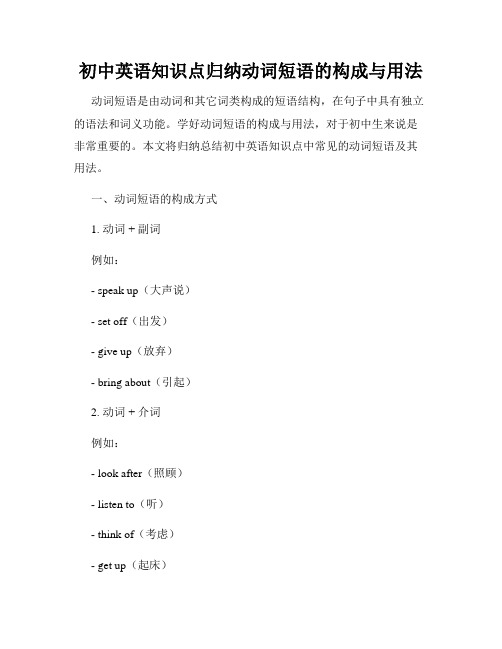
初中英语知识点归纳动词短语的构成与用法动词短语是由动词和其它词类构成的短语结构,在句子中具有独立的语法和词义功能。
学好动词短语的构成与用法,对于初中生来说是非常重要的。
本文将归纳总结初中英语知识点中常见的动词短语及其用法。
一、动词短语的构成方式1. 动词 + 副词例如:- speak up(大声说)- set off(出发)- give up(放弃)- bring about(引起)2. 动词 + 介词例如:- look after(照顾)- listen to(听)- think of(考虑)- get up(起床)3. 动词 + 名词例如:- make friends(交朋友)- take a walk(散步)- have a chat(聊天)- do homework(做作业)4. 动词 + 形容词例如:- make someone happy(使某人快乐)- keep something clean(保持某物清洁)- find something interesting(发现某物有趣)- get someone excited(使某人激动)二、动词短语的基本用法1. 表示动作动词短语作为动词的补充,用来表示人或事物所进行的具体动作。
例如:- He turned on the TV and watched his favorite show.(他打开电视看他最喜欢的节目。
)- They made a plan and started to implement it.(他们制定了一个计划并开始实施。
)2. 表示状态或性质动词短语在句子中常用来表示人或事物的状态或性质。
例如:- The flowers in the garden are blooming beautifully.(花园里的花朵正在美丽地开放。
)- The students are listening attentively to the teacher.(学生们正在专心倾听老师。
初中英语重点句型、短语(中考必背!)

[短语、词组归纳]由动词开头构成的短语、词组很多。
复习时应分类处理:一、动词+介词1.look at…看…,look like … 看上去像……,look after …照料… 2.listen to…听……3.welcome to…欢迎到……4.say hello to …向……问好5.speak to…对……说话此类短语相当于及物动词,其后必须带宾语,但宾语无论是名词还是代词,都要放在介词之后。
二、动词+副词“动词+副词”所构成的短语义分为两类:A.动词(vt.)+副词1.put on 穿上 2.take off脱下 3.write down记下此类短语可以带宾语,宾语若是名词,放在副词前后皆可;宾语若是人称代词,只能放在副词的前面。
B.动词(vi)+副词。
1.come on赶快 2.get up起床 3.go home回家4.come in进来 5.sit down坐下 6.stand up起立此类短语属于不及物动词,不可以带宾语。
三、其它类动词词组1.close the door2.1ook the same3.go to work/class4.be ill5.have a look/seat6.have supper7.1ook young 8.go shopping 9.watch TV/games10. play games[介词短语聚焦]“介词+名词/代词”所构成的短语称为介词短语。
现将Unitsl-16常用的介词短语按用法进行归类。
1.in+语言/颜色/衣帽等,表示使用某种语言或穿着……。
2.in + Row/ Team/ Class/ Grade等,表示“在……排/队/班级/年级”等。
3.in the morning/ afternoon/ evening/ 表示“在上午/下午/傍晚”等一段时间。
4.in the desk/ pencil-box/bedroom 等表示“在书桌/铅笔盒/卧室里”。
